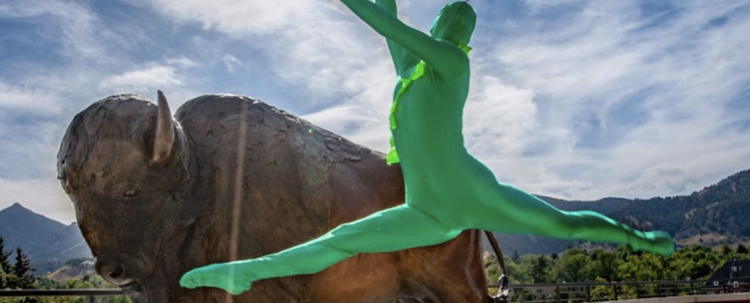
Performer at CU’s “climate cabaret”. (Photo courtesy of CU Presents)
In light of the climate crisis escalating, The University of Colorado’s theater troupe is spreading awareness with its new show, “Climate Cabaret.” Members of CU’s Department of Theatre & Dance partnered with New York’s Climate Change Theatre Action organization, bringing an exciting and timely performance to the University Theatre. On several dates until Oct. 3, a series of mini-plays come together to form a theatrical experience that should not be missed by anyone in the Boulder area.
Sam Weaver, mayor of the City of Boulder, attended a recent showing and prefaced the cabaret with a powerful statement: “Climate change touches every aspect of all of our lives and it will continue to do so increasingly. Art is very important when thinking about climate change, as it makes the subject more relatable and unites us all.”
Every actor came together to tell the Earth’s story and imagine a greener future beyond our time through comedy, musical theater, dramatic monologue and dance. Not only were the performances enjoyable, but they provided a spark of hope for each and every member in the theatre.
Actors came together to send a message. “Everyone, no matter how big or how small,” they repeated, “can change the world from the path it seems to be on and collectively harvest a greener future”.
As one watches the show, it is important to reflect upon the overwhelmingly poignant questions: “What will happen in time? Is it too late?” While it is true that 97% of the world’s climate experts acknowledge the reality of climate change, action still needs to be taken.
Throughout the play, it becomes increasingly apparent that acting now is what will guarantee the future generations of planet Earth a viable future. One of the scenes is especially powerful which asserts that “in school, climate change is taught as something we do not have to worry about, however, everyone must be involved. We can all do something to rewrite the story. Anything towards solving the climate change issue can trigger a chain reaction, which is why no action is too small.”
As the production went on, the audience got to travel through a series of greener possibilities such as completely wind-powered energy systems, responsible recycling examples, food waste limitations and discussions about 2021 as if we were 100 years in the future. All of these ideas and possibilities are creatively curated and had the audience members rolling with laughter in some instances.
As idealistic as all of these possibilities were, the actors were careful to recognize that these ideas are not all feasible. They all require an immense amount of funding and a complete switch of lifestyle for many individuals.
In a recent CUI interview with Ben Stasny, the show’s artistic director, it is clear that the theatre group is striving to bring awareness to climate change and incorporate eco-friendly practices into the process of curating a show.
“This show brings a larger view to climate change itself and aims to have a global perspective which is not so narrow,” Stasny said. “In addition, throughout the process, we have been reflecting on how we can be climate-conscious in theatre. We have repurposed sets, props, and costumes from past years; almost nothing is newly purchased.”
The whole cast and crew have really embodied the 3 Rs: reduce, reuse and recycle, with this production of “Climate Cabaret.”
For many new Boulder residents, it is their first time in an eco-conscious community. The idea of participating in the solution may feel overwhelming or like “a game with too many players,” says Stasny, but there are multiple ways to be involved. Even just spreading the word to family and friends about “Climate Cabaret” is a good place to start.
Other key questions to consider from the show were: “Is it worth the investment to try and save the planet all at once? Or are gradual adjustments better? Will this make any impact at all if the safe route is taken?” Each question highlights how complicated it is to resolve climate change issues.
As a collective group, passive support is no longer an option. This performance asks individuals to consider everyday personal choices, such as the types of foods they consume, the amount of food waste they contribute and alternative forms of energy usage. It even considers how many trees would be saved if recycled toilet paper were the mainstream choice.
One can expect to feel the powerful climate-centered message of this play since climate change affects everyone. More than anything, expect to be brought to a standing ovation, as the full house of audience members were during “Climate Cabaret”.
Tickets and information about “Climate Cabaret” can be found on the CU Presents website.
Contact CU Independent Staff Writer Haley Lauritzen at haley.lauritzen@colorado.edu.
